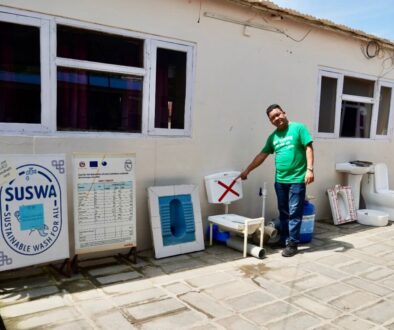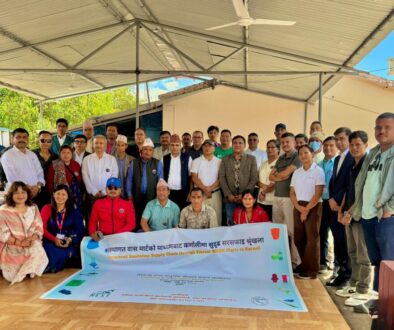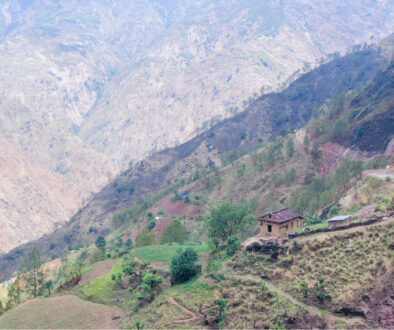Sustainable WASH for All and the Karnali Province chapter of the National Federation of Disabled – Nepal have signed an Memorandum of Understanding outlining a strategic partnership to work for disability inclusive WASH in 42 municipalities in Karnali. NFD-N and SUSWA have already piloted this partnership by organizing training for SUSWA staff (together with CBM) and co-facilitating a gender and disability aware policy appraisal and inclusive budgeting workshop in Kanakasundari, Jumla.
In line with SUSWA’s outcome areas and NFDN’s mission and objective, SUSWA and NFDN will coordinate and collaborate, both together and separately, towards the goals of:
- Data collection on disability and organisations for persons with disabilities in project municipalities
- Project municipalities have Water Users and Sanitation Committees with persons or family members of persons with disabilities in key positions
- Project municipalities have accessible institutional WASH services
- Project municipalities involve organizations for persons with disabilities in the WASH planning and monitoring
- Project municipalities in Karnali have developed and implemented evidence-based gender and disability-responsive laws, plans and budgets

SUSWA staff and Bishnu Prasad Sharma, President of Karnali branch of NFDN at MoU signing
Disability inclusion is a cross-cutting objective of SUSWA
Gender Equality, Disability and Social Inclusion, GEDSI, is a cross cutting objective of the project, highlighting the importance of disability inclusion to reach ‘for all’. GEDSI is part of a human rights-based approach (HRBA) to programming that recognizes the diversity of people and focuses on identifying harmful social norms, stigma and discrimination and addresses barriers in a way that ensures equal participation in decision-making and realization of human rights in the provision of WASH facilities and services. Accessibility and physical barriers in the design of WASH facilities, equipment and surrounding environments – for example, taps that are not in easy reach or latrines that require a person to squat without any support – could be partially solved by technical solutions. However, this would not be sufficient to overcome the disproportionate exclusion of persons with disabilities from WASH that is caused by a range of factors, that include (but are not limited) to the following:
- Attitudes, stigma and discrimination relating to disability and WASH – for example, the belief that persons with disabilities are incapable of contributing to WASH-planning decisions.
- Inaccessible WASH communication materials and formats – for example, complex written information that is difficult to read or understand; or spoken communications provided without sign language interpretation.
- Policy and institutional factors – for example, the lack of budget allocation to implement inclusive WASH policies;
- Lack of disability-related data to inform programming.
Women and girls with disabilities experience barriers to WASH relating to the intersection of gender and disability.
Women and girls with disabilities may be expected to perform household WASH duties, even if their facilities are inaccessible. Those who care for family members with disabilities experience additional WASH challenges, such as increased labour in fetching water or performing hygiene tasks. Girls with disabilities may leave school early if dignified menstrual hygiene management facilities are inaccessible to them.
The SUSWA project adopts a twin track approach of 1) mainstreaming GEDSI in all project plans and activities to ensure GEDSI responsive WASH implementation and equal access and participation, and 2) targeting activities for dignified menstruation management (DMM) and disability inclusion (DI) to address specific forms of harmful social norms, stigma and barriers that prevent women and girls and persons with disabilities accessing WASH and DMM on an equal basis with others.
Mainstreaming disability inclusion requires a systematic assessment of potential barriers that people face in terms of accessing services and decision-making processes, and, at minimum, a systematic collection and use of disability disaggregated data by using the internationally validated methodology, the Washington Group questionnaire, which takes a functional approach to disability. In addition, relevant indicators that measure inclusion and analysis of services and processes from a GEDSI perspective will need to be integrated in the SUSWA results framework as well as in the monitoring of the results. Mainstreaming will require that SUSWA establishes meaningful partnerships with local and relevant national Organizations of Persons with Disabilities (OPDs) and ensures consultation and participation in decision-making and design processes. Further, it is also recognized that this perspective will require systematic capacity development and awareness building among all stakeholders, on the HRBA to disability. As a first step, SUSWA staff, WASH Units and Municipal staff in project working areas need to be capacitated through training and having clear plans and guidelines to follow. SUSWA staff are already oriented basically on disability inclusion and now WASH Units and Municipal staff in project working areas are to be capacitated. They should have a clear understanding on prevailing policies on the rights of people with disabilities, policy gap analysis and disability inclusive planning.
National Federation of the Disabled Nepal is an organization that advocates for the rights, interests and entitlements of persons with disabilities across the country.
NFDN was established in 1993 (2050 BS) as an umbrella organization run by persons with disabilities as a regional organization with nine member organizations. Now, with more than 300 member organizations in 74 districts, the umbrella organization has been working in coordination and partnership with national and international governmental and non-governmental bodies, UN agencies to establish disability inclusive structure, laws, system, safeguard access to services, enhance capacity and promote meaningful participation of persons with disabilities in all social, political, cultural and economic sectors.
NFDN complements the advocacy efforts of its member organizations from local level to federal structure of the state in promoting human rights of persons with disabilities and in inclusive development for the dignified life of persons with disabilities. NFDN contributes in promoting and protecting the rights of persons with disabilities and Disability Inclusive Development in Nepal through its strategic actions–Advocacy, Awareness, Capacity Building and Networking & Collaboration and in a joint venture of its member organizations from local to federal level.
At national level, NFDN is the member of the Disability Advisory Desk under the Prime Minister’s office, Special Education Council under Department of Education, National Development Council and Law Improvement Commission under the Ministry of Law and Justice.
NFDN has very influential and proactive roles for formulating, changing, implementing disability related legal provisions, and building the leadership and advocacy capacity of Disabled People’s Organization (DPOs) in Nepal. NFDN has its presence in all seven provinces in the leadership of Provincial Executive Committees in the capital cities of the provinces.
National Federation of the Disabled Nepal envisions a society and state where all persons with disabilities are living a quality and productive life without any barrier in an inclusive environment with full and equal realization of all human rights.
The objective of NFDN is to contribute to achieve the overall objective of inclusive development of the nation by mainstreaming disability issues in all development processes and persons with disabilities in all decision making processes.
The mission and longterm goals of NFDN mirrors the outcomes of SUSWA, e.g.,
- Promotion, protection, access to services and inclusion of persons with disabilities.
- Protection, promotion and effective implementation of Convention on the Rights of Persons with Disabilities (CRPD) in Nepal.
- Meaningful participation of persons with disabilities or their representatives in the process of policies and laws formation, its implementation and monitoring and all other decision making processes of the state affecting their life.
- Adequate constitutional provisions, policies, laws to address the all human rights and needs of persons with disabilities.
- Availability and mobilization of adequate countrywide structure, mechanism and resource (human, technology, knowledge, skills, finance and information) for the effective implementation of disability related constitutional provisions, laws and policies
- Easy access of persons with disabilities to health, education, employment/livelihood, empowerment, social participation, physical facilities, assistive devices and attendants, rehabilitation services, reasonable accommodation, including all services, facilities and opportunities connected to their special needs as their rights.
- Sensitive and responsible government and relevant stakeholders towards the rights, issues and needs of persons with disabilities
- Institutionalization of the Rights based Approach of Disability at the community level.
Mainstreaming disability
strong National Federation of the Disabled Nepal is an organization that advocates for the rights, interests and entitlements of persons with disabilities across the country. NFDN was established in 1993 (2050 BS) as an umbrella organization run by persons with disabilities as regional organization with nine member organizations. Now, with more than 300 member organizations in 74 districts, the umbrella organization has been working in coordination and partnership with national and international governmental and non-governmental bodies, UN agencies to establish disability inclusive structure, laws, system, safeguard access to services, enhance capacity and promote meaningful participation of persons with disabilities in all social, political, cultural and economic sectors.
NFDN complements to the advocacy efforts of its member organizations from local level to federal structure of the state in promoting human rights of persons with disabilities and in inclusive development for the dignified life of persons with disabilities. NFDN contributes in promoting and protecting the rights of persons with disabilities and Disability Inclusive Development in Nepal through its strategic actions–Advocacy, Awareness, Capacity Building and Networking & Collaboration and in a joint venture of its member organizations from local to federal level.
As a non-governmental organization, NFDN has been leading disability rights movements in Nepal since 1993. Internationally, NFDN is the member assembly of Disabled Peoples’ International (DPI) and represents Nepal in the DPI Asia Pacific region as vice-president, and South Asia as president. At national level, NFDN is the member of the Disability Advisory Desk under Prime Minister’s office, Special Education Council under Department of Education, National Development Council and Law Improvement Commission under the Ministry of Law and Justice.
NFDN has very influential and proactive roles for formulating, changing, implementing disability related legal provisions, and building the leadership and advocacy capacity of Disabled People’s Organization (DPOs) in Nepal. NFDN has its presence in all seven provinces in the leadership of Provincial Executive Committees in the capital cities of the provinces.
Vision of NFDN
National Federation of the Disabled Nepal envisions a society and state where all persons with disabilities are living a quality and productive life without any barrier in an inclusive environment with full and equal realization of all human rights.
Mission of NFDN
- Effective Leadership of NFDN and its member organization for the human rights
- Promotion, protection, access to services and inclusion of persons with disabilities.
- Protection, promotion and effective implementation of Convention on the Rights of Persons with Disabilities (CRPD) in Nepal.
- Meaningful participation of persons with disabilities or their representatives in the process of policies and laws formation, its implementation and monitoring and all other decision making process of the state affecting to their life.







